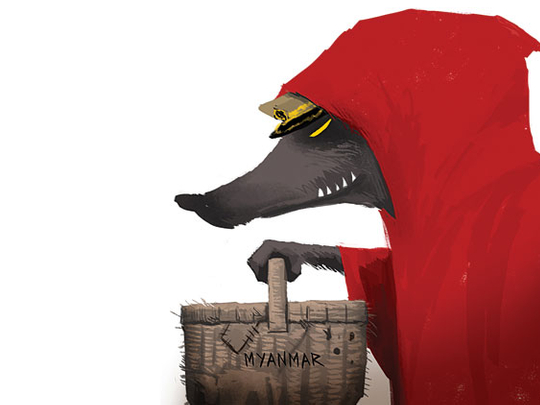
Myanmar is a story just waiting for a fairytale ending. The beautiful daughter of an assassinated national hero faces down evil generals during years of cruel incarceration.
For decades, the generals grind the country into the ground, trashing the economy and fighting ethnic minorities in the wild border regions. Finally, the generals relent. They release “the Lady” and begin a remarkable transition to democracy.
Political prisoners are set free. The press is unshackled. Western sanctions are lifted. Ceasefires break out throughout the land. All that remains is for the military to return definitively to barracks and allow Aung San Suu Kyi, the princess of this tale, to take up her rightful position as leader of a democratic, peaceful and prosperous country. It is so close you can almost touch it.
Yet ,it is not to be. Three years after the start of the transition, and less than 18 months before elections that would make Suu Kyi president, it is already apparent that the ending cannot be quite so happy. There are at least three problems with the fairytale plot.
First, it looks unlikely that Suu Kyi will become president — at least not right after next December when elections are due to take place. Last month, a parliamentary committee voted against changing the constitution, which bars anyone from the presidency whose spouse or children are foreign nationals.
Suu Kyi’s two sons are British citizens. Assuming the current electoral system stands, Suu Kyi’s National League for Democracy would need to win a thumping two-thirds of seats just to get a bare majority in parliament. That is because the military retains 25 per cent of seats as its right, something it is not likely to give up.
If Suu Kyi’s NLD does win a majority, she will be able to pick the president — so long as it is not herself. She could do a Sonia Gandhi by selecting a weak proxy and running things from behind the scenes.
More likely, she will go with either Thein Sein, a former general and the current President, or Shwe Mann, another former member of the junta, who is now speaker of the lower house. Suu Kyi can possibly take the position of speaker herself. After all, even some of her most ardent admirers wonder if she really has what it takes to run the country. Being speaker will not be a disaster, but it is hardly the Princess and the Glass Slipper.
What of the peaceful land? Talks with ethnic minorities, some of which have been fighting the central government for half a century, are going surprisingly well. With one big exception — Kachin state. There is a ceasefire with all the main ethnic groups. No one doubts that the endgame is a federalist state.
Time, however, is running out. If peace is to be secured before the elections, participants reckon a nationwide ceasefire needs to be signed by August. That looks tricky. A lasting political settlement will be harder still. Even if one is achieved, that will not bring full security. Much of Myanmar’s border is lawless, ruled by smugglers of drugs, jade, timber and people. An end to war is not the same thing as peace.
An even more serious challenge is the emergence of Buddhist nationalism. There has been gruesome violence against Muslims, who probably make up more than 10 per cent of the population. (A census is only now being conducted.) In Rakhine state, which borders Bangladesh, dozens of Muslims have been killed and tens of thousands forced to abandon their homes for squalid camps. Violence has spread to the interior.
Last March, 43 people were killed in the central town of Meikhtila. Just this month, a curfew was imposed on Mandalay after two men, one Buddhist and one Muslim, were hacked and beaten to death.
Third, what of the prosperous nation over which Suu Kyi is supposed to preside? Myanmar has gross domestic product per capita of $870 (Dh3,200) — lower than Bangladesh. Many people have no electricity. Foreign investors have flooded in, searching for opportunities in the great new frontier market, but few have actually invested.
Washington continues to review sanctions and keeps many former “cronies” of the generals on a blacklist. Cumulative US direct investment in the country amounts to $244 million. That compares with the $14 billion China has poured in. One market researcher estimated that out of Myanmar’s 55-60 million people, a mere 120,000 households counted as middle class.
We should hardly be surprised. What could we really expect of a nation that has been isolated, impoverished and locked in war for five decades? The Arab Spring has shown that getting rid of dictators is the easy part. Very few of Myanmar’s neighbours are paragons of democracy and stability.
Richard Horsey, a leading analyst of the country, says it is partly their own fault for depicting Myanmar in over-simplistic terms, “the iconic Lady versus the evil generals”. The country, he says, has been a deeply damaged place since independence. The idea that one woman’s release could set everything right was a fantasy from the start.
Financial Times











